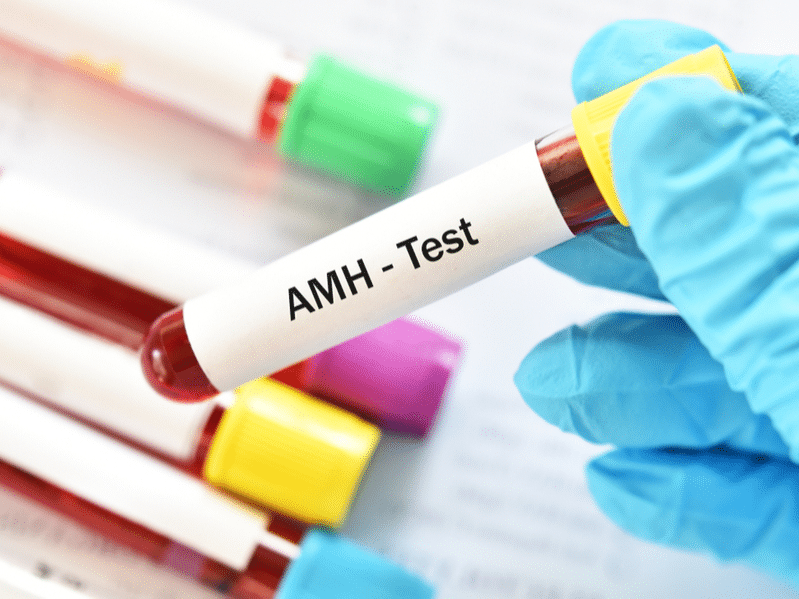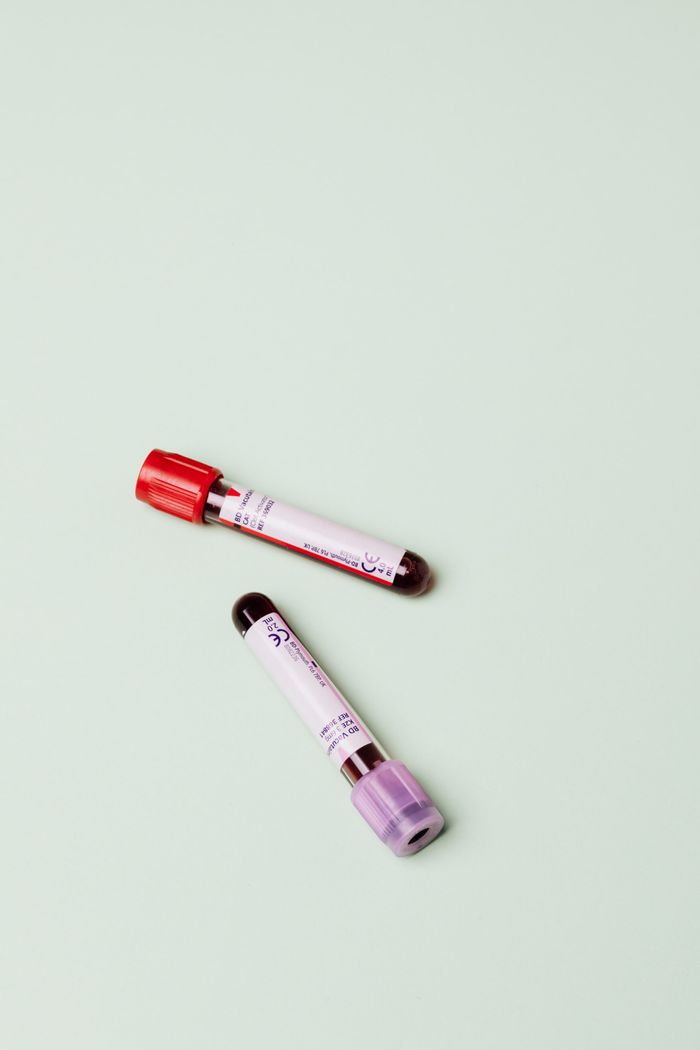Fertility Testing
Anti Mullerian Hormone (AMH) Test & Ovarian Reserve
Welcome to Fertility North, a leading fertility clinic in Perth, Western Australia. For over 20 years, we have provided fertility testing services such as AMH testing to individuals wanting to better understand why they might be facing challenges in conceiving.

What is an Anti-Mullerian Hormone (AMH) Test
The AMH blood test measures the level of Anti Mullerian Hormone in a woman’s blood. This hormone is an excellent indicator of ovarian reserve (the remaining number of eggs) and is also well correlated with conditions like polycystic ovary syndrome (PCOS).
What is AMH?
Anti Mullerian Hormone (often known as AMH) is a hormone secreted by early-developing egg sacs (follicles) in the woman’s ovaries. Research shows that AMH levels offer an indication of how many eggs remain in the ovaries, essentially reflecting her current ovarian reserve. Previously, the FSH (Follicle Stimulating Hormone) test was the primary method to gauge ovarian reserve, but the AMH test has proven to be a more precise tool. Ideally, the AMH test should be conducted between days 5 and 10 of the menstrual cycle but may be done anytime.
Do I need an AMH test?
This simple blood test, sometimes called an ‘egg reserve test’, is vital for women wanting insights into their ovarian reserve to aid in family planning. You may wish to consider testing your AMH level if:
- You’ve been trying to conceive for over six months.
- You’re exploring fertility treatments or other reproductive options.
- You’ve undergone chemotherapy, ovarian surgery, or any procedures that might impact your ovarian reserve.
- You have a suspected ovarian tumour.
- You want insights into your remaining eggs and current ovarian reserve.
When should you do an AMH test?
At Fertility North, we recommend undergoing an AMH test during the first few days of your menstrual cycle. However, AMH levels are consistent and are barely influenced by factors like the menstrual cycle, hormonal contraception, or pregnancy. This means the egg reserve test can be done anytime during your cycle.
We will always discuss the ideal timing with you prior to your test date.
Why is the AMH test important?
The main benefit of getting an AMH test is that it gives you foresight. As the average age of women having children rises, many specialists are now prompting women to consider their reproductive options sooner rather than later. With conditions like PCOS affecting fertility, understanding your AMH level can be crucial. Knowing if you have normal AMH levels can help guide your reproductive decisions. For instance, those with a lower AMH might want to research and explore fertility preservation or treatment earlier.

How to book an AMH test
Option 1 – existing Fertility North patient
A fertility specialist or referring doctor must request an AMH test. If you’re affiliated with Fertility North, your specialist can arrange the test for you.
Option 2 – not a patient at Fertility North
If you aren’t a Fertility North patient, approach your GP for a referral for an AMH test.
Interpreting AMH test results
What happens after I get an AMH test?
Once your test is complete, your referring doctor will discuss your test results with you. These results can predict response to fertility treatments, giving insight into which procedures may be most effective. For example, AMH is useful for predicting the response you might have to IVF, in terms of the likely egg number that will be obtained in an IVF cycle. Understanding the AMH test and potential outcomes can help you make informed decisions about your future fertility plan.
Are AMH tests reliable/accurate?
Yes, AMH tests are considered to be both reliable and accurate in assessing a woman’s ovarian reserve. It is important to note that a high intake of Biotin (Vitamin B7) or the use of oral contraceptives may influence the accuracy of the result.
AMH levels are consistent and are barely influenced by factors like the menstrual cycle, hormonal contraception, or pregnancy. This means the egg reserve test can be done anytime during your cycle. When combined with specialised ultrasound assessing small follicles in each ovary, the AMH test provides a comprehensive view of future fertility. A low AMH level might indicate low ovarian reserve, while a high AMH result could hint at PCOS.
What does it mean to have low AMH levels?
Low AMH levels indicate a reduced ovarian reserve, meaning that there are fewer eggs remaining in the ovaries.
Women, and patients with ovaries, are born with all of the eggs they will ever ovulate in their lifetime. The number of eggs each person starts with can vary greatly from one person to the next, but whatever the number we start with, the number of eggs we have remaining (ovarian reserve) falls over time. The rate of this loss increases significantly from our mid-to-late 30s. Put simply, the lower your AMH level, the lower the number of eggs you have left in your ovarian reserve. A low AMH level in isolation is not necessarily a cause for concern.
Factors that influence AMH levels & ovarian reserve
The main factors that influence AMH levels and ovarian reserve include PCOS, history of ovarian surgery, chemotherapy and other gonadotoxic treatment, oral contraception (use of the combined oral contraceptive pill may influence the accuracy of AMH testing), obesity, Vitamin D deficiency and mutations of the BRCA genes.
What are normal AMH levels
The reference range, or normal range, for AMH is 5.5 – 37.4pmol/L. An AMH of >22pmol/L may be associated with PCOS and ovarian hyperstimulation syndrome (OHSS), an over-response the the stimulation medications used in fertility treatments.
Exploring fertility treatment options
Understanding your ovarian reserve is incredibly useful, especially if you’re considering fertility treatments. Every patient’s journey is unique; what works for one might not for another. If you want to explore our other fertility treatments or find out what your fertility journey might look like, reach out to our fertility specialists today.

Frequently Asked Questions about AMH Tests
Can i do an AMH test during my period?
Yes, the period (menstruation) is considered early in the menstrual cycle so it would be an acceptable time to get your AMH levels tested.
Is an AMH test covered by Medicare?
No, unfortunately, the AMH blood test is not covered by Medicare, it typically costs patients $70 out of pocket.
Can AMH tests detect pregnancy?
No, AMH tests specifically measure the levels of anti-Mullerian hormone to assess ovarian reserve and not pregnancy.
Does the AMH test require fasting?
No, fasting is not required for an AMH test.
How long does the AMH test take?
The test itself is quick and involves drawing a blood sample. Results usually come back within a few days to a week, depending on how busy the testing laboratory is.
How quickly do AMH levels decrease?
AMH levels generally decline with age. The rate can vary among individuals, but a significant decline is commonly seen as women approach their late 30s and early 40s.
Can AMH levels fluctuate month to month?
While AMH levels provide a consistent estimate of ovarian reserve, slight fluctuations can occur month to month. However, these changes are usually minimal and don’t dramatically affect the interpretation.
Can you test AMH while on birth control?
Yes, however, some birth control may influence AMH levels. Please discuss this with your Doctor prior to having your AMH test.
What AMH level indicates PCOS?
Higher AMH levels can be indicative of Polycystic Ovary Syndrome (PCOS) with studies suggesting that anti-Müllerian hormone (AMH) levels greater than 22pmol/L can be indicative of PCOS. However, a comprehensive diagnosis of PCOS requires considering other symptoms and test results.
What AMH level indicates Menopause?
AMH levels alone cannot be used to predict the age of menopause with precision. However, there is a steep decline in the level of AMH prior to the final menstrual period. An AMH less than 5.5pmol/L indicates diminished ovarian reserve,
What AMH level is considered good for pregnancy?
A higher AMH level suggests a higher ovarian reserve, which can be favourable for pregnancy. However, AMH is just one factor, and overall fertility depends on various factors. Women with a low ovarian reserve and women with a high ovarian reserve still fall pregnant naturally.
Why might an AMH level be low?
Low AMH levels might indicate a reduced ovarian reserve. It can be due to natural aging, certain medical conditions, surgeries, or treatments like chemotherapy.






